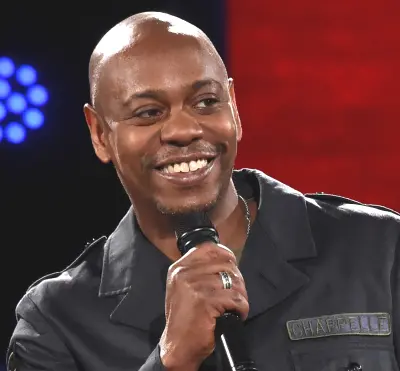Dave Chappelle has become "a ghost of comedy past"
-

Danielle Fuentes Morgan, who teaches a class on African American comedy, says Chappelle has evolved from his status as a groundbreaking comedian to becoming "out of step not only with the comedy of the moment but with the zeitgeist in general." And it has nothing to do with Chappelle's age. Tig Notaro, Leslie Jones, Marc Maron, and Paul F. Tompkins are all older than Chappelle, yet continue to resonate with younger audiences. "Part of Chappelle’s early appeal was his stoner charm — he was the funniest pothead in the dorm," says Morgan. "But in recent years that analogy has lost its savor, especially with students; for the new generation, his approach has been akin to an out-of-touch uncle who corners you at the holidays when you’re just trying to hang out with your cousins. He’s forgotten what my students know: that comedy exists in the terrain where boundaries are recognized and then transgressed without harming people who don’t deserve it. When boundaries are transgressed and people who don’t deserve it are harmed, it’s no longer comedy — it’s horror. Last week, Netflix co-CEO Ted Sarandos sent out a memo to Netflix staff in support of Chappelle, saying, 'While some employees disagree, we have a strong belief that content on screen doesn’t directly translate to real-world harm.' Sarandos later walked back his defense as an “oversimplification,” but it wasn’t just too simple; it was demonstrably false. In talking about the real-life implications of comedy, I refer my students to the tropes of the minstrel stage in the 19th century, which were used to support chattel slavery, recruit KKK members, and enact continuing violence against Black people. These racist caricatures demonstrated to eager white audiences that slavery was good for the enslaved because look at how happy their stand-in was on the stage. The performance was used to justify the status quo and erase the appearance of the violent reality only so that the violent reality could exist in secret. It was specifically intended to have real-life consequences. Chappelle — who left his multimillion-dollar contract with Comedy Central in 2005 — certainly knows that more acutely than most. He quit after dressing up as a Zip Coon minstrel in blackface. When he realized a white crew member was laughing at him and not with him, he concluded that the sketch was 'socially irresponsible.' Today, his loudest supporters aren’t talking about hilarity, they’re talking about free speech, people being too sensitive, cancel culture. He’s not getting as many laughs as he’s getting 'clapter' that’s usually associated with self-satisfied leftist ideologies but that here allows conservative viewpoints validation because they’re being espoused by a traditionally left-leaning Black man. This kind of response has less to do with jokes and more to do with ridicule. It shows you agree with who is being targeted. It’s the sort of response the minstrel stage elicited, and it’s also the response that made Chappelle leave his show in 2005 when it was directed at him. Of course, these same supporters are quick to remind people on social media that if you don’t like his style, you don’t have to watch. And, unfortunately for Chappelle, that might ultimately be what’s happening. It’s not until I show students clips from Chappelle’s earlier stand-up specials that they start to understand what was once his appeal. They can see why we were laughing then, but they’re watching a ghost of comedy past."
TOPICS: Dave Chappelle, Netflix, Dave Chappelle: The Closer, LGBTQ, Standup Comedy
More Dave Chappelle on Primetimer:- “I’ve been to Puffy’s house”: Dave Chappelle reveals Diddy’s bizarre question at a party, jokes missed “my big chance to f*ck Cassie”
- What did Dave Chappelle say about Charlie Kirk? Saudi Arabia joke controversy explained
- Is The Huxtables starring Dave Chappelle releasing on Peacock in 2025? Viral poster debunked
- Hannah Gadsby Returns to Netflix With a Burst of Joyous Comedy
